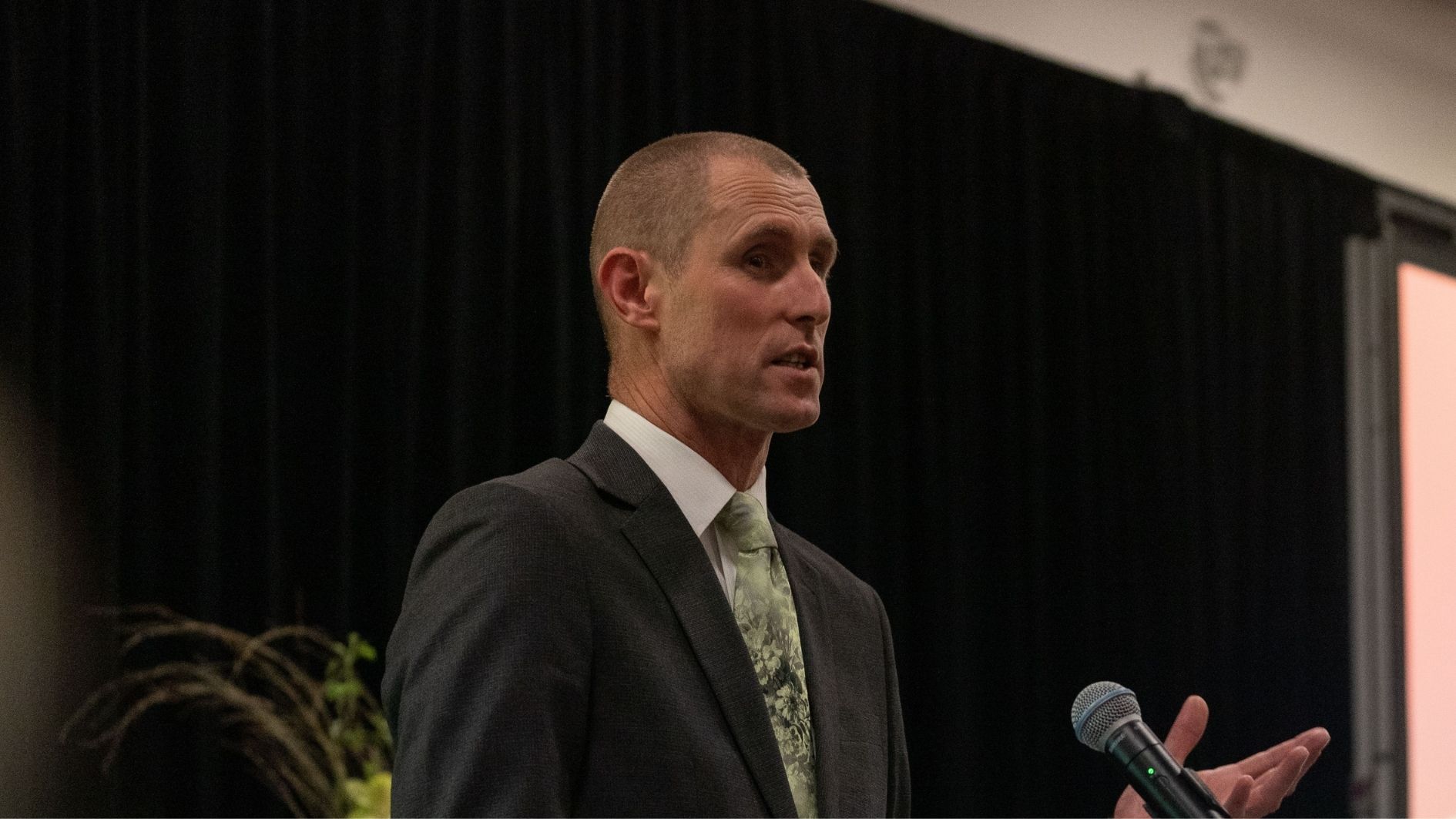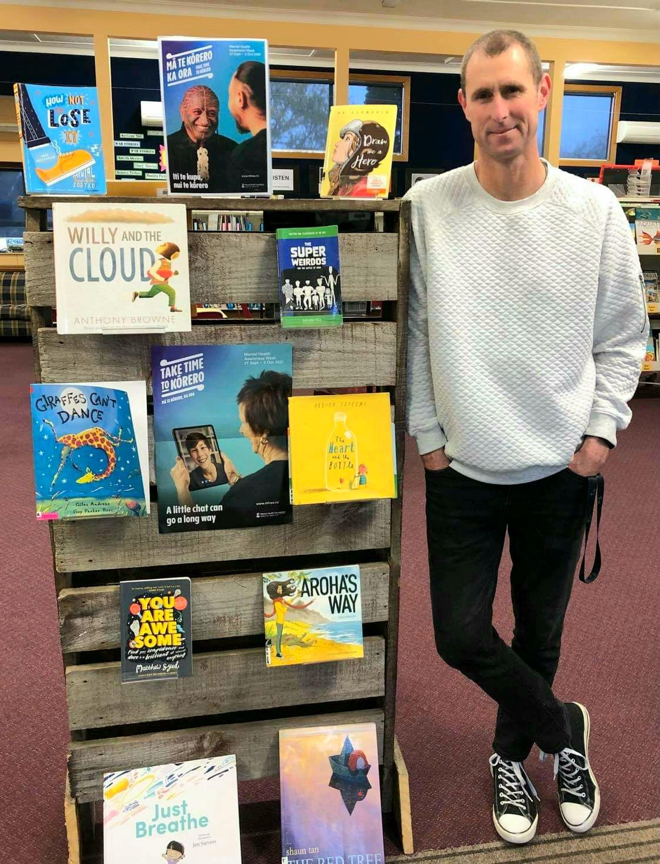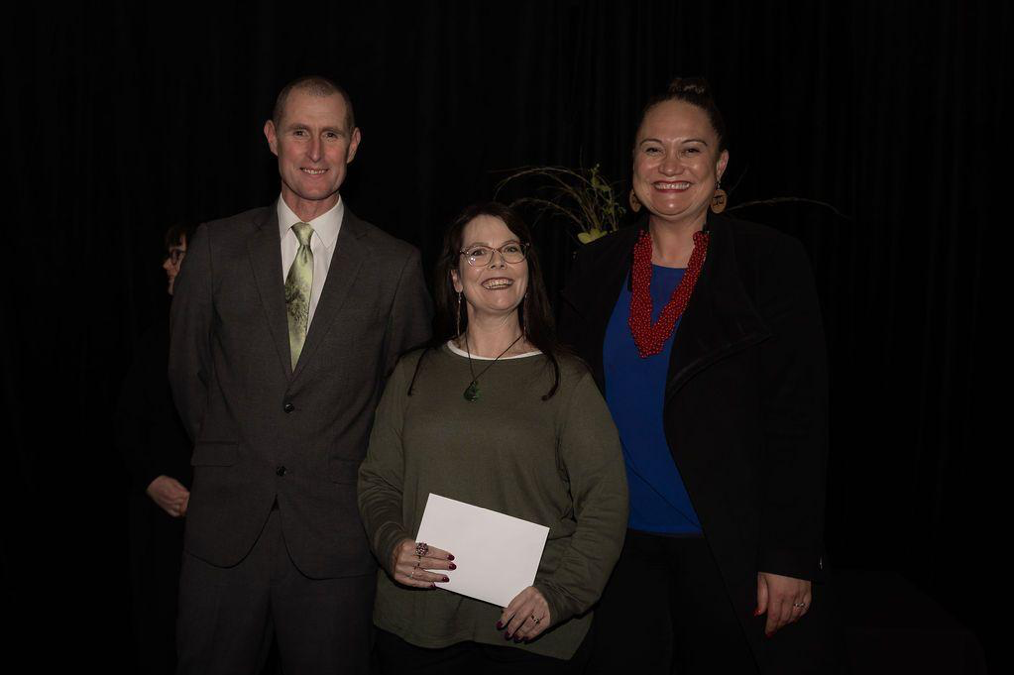Alan Dingley is a Librarian at Palmerston North Intermediate Normal School, former Youth Librarian at Palmerston North City Library’s Youth Space, a presenter of talks and workshops on children’s literature and readers advisory, an award-winning theatre sports extraordinaire, and a keen footballer in his spare time. Hana Whaanga talked to him about being a New Zealand Book Awards for Children and Young Adults judge for two years in a row, and what he is passionate about in the world of children’s literature.

So how does judging work for the NZBACYA? I’m interested in the process from go to whoa. When and where does it start?
Applications are sought from October onwards, so basically represent yourself! I was surprised when I got the nod at my first crack, so don’t do the ‘Oh no point me applying’ type thing. You get all the info on process and expectations, then the wondrous packages start arriving! The 150+ books are usually broken up into 3–4 deliveries, from November through to the end of February, which is a lot of time…and also NOT! Then, in my years, judges had the shortlist zoom meeting in April where we debate our desired selections, and deliberate them down to 5 each category, then a wee while later the ‘in-person’ winners meeting is held. A whole day is taken to nut out the winners, then of course it all finishes with the awards ceremony. It’s a rollercoaster for sure.
What was the hardest part about judging for book awards with 150 books to read? How did you combat reviewing and critiquing fatigue?
Taking breaks from reading, but also taking a break from a certain genre/category too. I learnt so much from the first year I did it, and that saved me a bit of stress/judging fatigue. I have always read for enjoyment, so learning to read to judge was an interesting process. Should start with categories with thicker volumes first, such as Junior/Young adult Fiction so then you can finish with quicker, and usually lighter-content Picture books.
Trust your instincts, and be prepared to be punched in the feels with some of the beautiful content around.
Trust your instincts, and be prepared to be punched in the feels with some of the beautiful content around.
What do you think you brought to the judging panel?
I think I had a few bases covered. I am a parent to children in the awards age target, I am a school librarian so I am peddling the product we’re judging, and I’ve worked with children and young people for over 20 years. I hope I brought honesty about what children and young people are reading, not what they are advertised to be reading, or being told to read. Regularly placing books in the hands of students gives you a good handle on what is really interesting for them.
What is different about being a convenor than a judge?
Not too much, but you do have to be prepared to be that deciding vote if there is a stalemate or a difference of opinion. I think a good convenor is good with people, a good listener, and happy to occasionally redirect any debate that may possibly de-rail due to passionate debate! It is honestly great fun.

In your view, who is the audience of the NZCYA?
The question for me isn’t ‘Who is?’ it is ‘Who should be…?’. It should be the readers.
We absolutely need to (and the NZCYA does an awesome job) of promoting NZ books, authors, illustrators, translators, and publishers, but I also believe that we should be highlighting the audience. The readers need to feel that this award process is as much about them, as it is about the other elements in the process. They issue the books in libraries, and they buy the books in bookshops. We need to continue to foster the passion for reading that enables all of the authors, illustrators, translators, and publishers to supply us with the gems they do.
Do you think everyone else knows this?
There are always ways you can improve your delivery, or the message. The NZCYA crew is a small unit and they can only do so much, and believe me they do a HUGE amount to make all of this happen. I believe we can find ways to engage with schools and communities to make them part of what is already a pretty special process.
…I also believe that we should be highlighting the audience.
It’s next to impossible to get young people to read without showing passion and enthusiasm for what you’re promoting. If they see someone judging something they’re passionate about, they need to see something of themselves in them. We always have amazing, intelligent judges, and I believe that will continue, but we must ensure that our audience is seeing themselves reflected in the judges.
How would you include (or recruit) a younger eye critiquing the books?
I believe somehow involving a young person (10-14) to be part of the shortlisting/or winners process. Tricky logistically but I believe we could, for instance, have a nationwide essay (written or video) competition, and the winner would assist the judging panel in some way.
Why do you think there is a predominant female representation in the judging of these awards and do you know statistically how many men, have been on the judging panel for the NZCYA Awards?
I do not know the statistics but I believe it reflects a larger NZ problem with boys and literacy. Our country has always put forward a very macho personae for boys to live up to, and when I was a kid if you were a reader you were in the minority. It’s reflected in the field of librarians as well. If we want our literacy rates amongst boys to rise, we need them to read for pleasure. They need to see their parents, teachers, role-models all reading. Get some All Blacks to promote books, libraries and bookstores as part of their contract, and we’d start smashing the literacy gap for boys.

Do you think gender representation matters in judging panels for children’s book awards anywhere?
Absolutely. The panel must attempt to be as diverse as its audience. Same goes for culture, ethnicity, people with special abilities and more. The panel is served a smorgasbord of books, so the panel’s palate must be just as diverse.
You mentioned in previous communication with me that you think the book awards need to get schools and libraries involved more, “I would love schools and libraries to be front and centre with pushing the books involved. That’s the win-win”.
Schools and libraries are the front-line of the reading battle so I believe having Librarian/teacher representation is a no-brainer. They see the day-to-day patterns of what young people are reading, and wanting to read. They are engaging first hand with the audience, attempting to place books in hands that will hopefully one day write a book, or be a Book Awards judge.
I say with pride that I am a dealer of books, and I hope to make addicts of my students.
Schools and libraries are the front-line of the reading battle so I believe having Librarian/teacher representation is a no-brainer.
What does the roadmap look like for that to happen?
If only there was a simple solution! We need to make sure our teachers and Librarians are passionate about reading, and they must shelve all bias about ‘what is good’ as every child wants something a little different. Don’t turn your nose up at The Day My Bum Went Psycho, or Twilight. Talk to them about why they like it, and be prepared to make the next suggestion for them that suits that preference. We need to upskill our librarians in book knowledge, not library knowledge. They need to have a book map in their heads ready to go, what book is next, then what is the next book, and so on and so on. Passion is the key to engagement.
And targeted funding for school libraries and librarians would be a HUGE start too (but I won’t get started on that issue as it makes me a bit grumpy!)
In your experience, what do you think could be done better by the New Zealand book awards trust?
People don’t really see the huge effort that goes on behind the scenes with the NZCYA. Their administration/back-room people are so brilliant and passionate. Some things I mentioned earlier I have put forward for reflection, such as a connection with schools to promote the awards, to foster that audience engagement. Just finding different, more agile thinking about how to ‘get the word out there’.
Don’t turn your nose up at The Day My Bum Went Psycho, or Twilight. Talk to them about why they like it, and be prepared to make the next suggestion…
What differences did you see in the books between the two years you were on the panel? What trends did you notice?
In my two years there were a lot of books dealing with wellbeing/anxiety issues, which can be great as those are conversations sorely needed in NZ. Of course with that comes the responsibility of making sure your message is on point, and is not just pretty balloons in the sky.
Also the illustrators are raising the bar, some beautiful work is out there and selecting the shortlist for the Russell Clark Award for Illustration was probably the most difficult choice we made.
Were there any books that the judges didn’t agree on? Because what one person gets from a book, another won’t necessarily also, you know?
There were some books that we had to have pretty robust discussions about, but with complete honesty there weren’t any that we got stuck on. That is why the diversity of the judges must be a key thought with selection, as we had 5 deliciously different brains attacking the books from all sides—it was great fun!
Who would you recommend the experience to? Who do you think needs to apply to be on the judging panel for 2022?
Anyone who has passion for reading and experience with the field of children’s books—and experience with children I think can be a great help too! Those are the main needs I believe, don’t let age, or your own perceived lack of experience stop you.
Just do it! Bring the passion and who knows what may happen?
There were some books that we had to have pretty robust discussions about…
Have you shoulder-tapped someone on the 2021 panel to step up and be convenor next year?
Names have been bandied about. As Convenor, you are asked your opinion to be thrown into the mix and I look forward with anticipation to find out who the lucky devil is!
Aaaand lastly, what one word would you use to summarise the experience?
Bountiful.
The Book Awards Trust is currently seeking judges for the 2022 edition of the Book Awards for Children and Young Adults. Find out more on their website.
Hana Whaanga
Hana Whaanga is a life-long learner, a Playcentre and freeplay advocate, and an employed Librarian. Born in Wellington and now living in Hawke’s Bay, she enjoys deep and meaningful conversations, asking the hard questions and connecting people to information and ideas.



